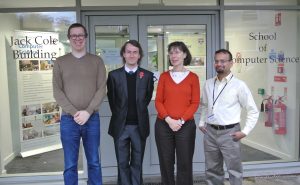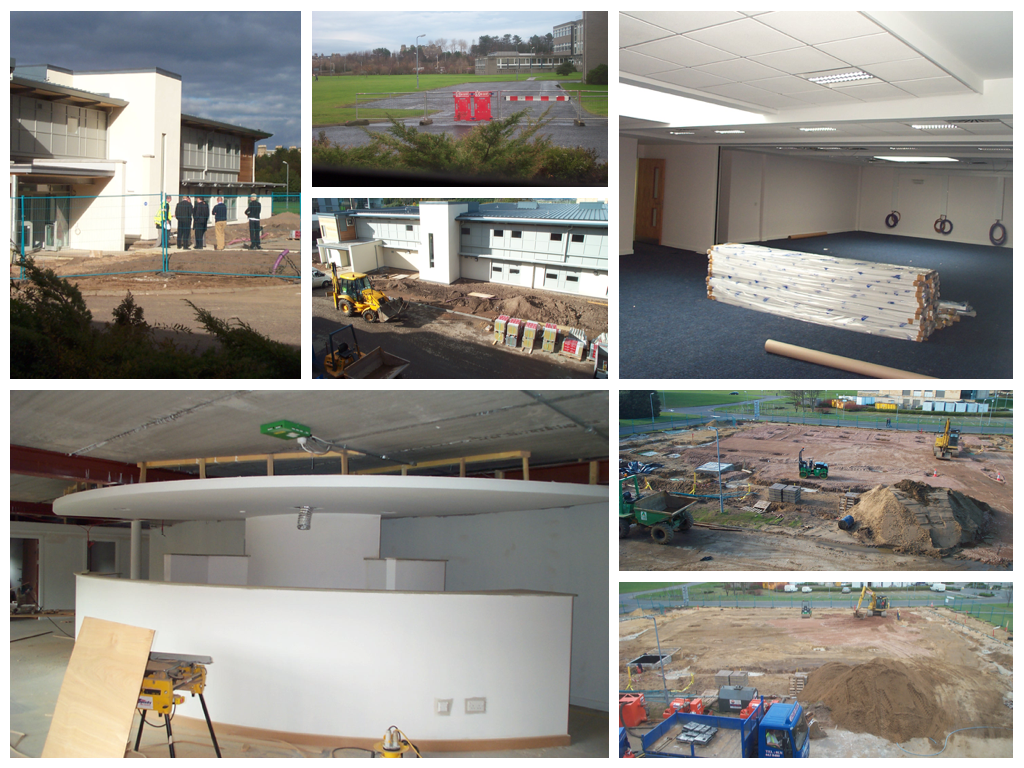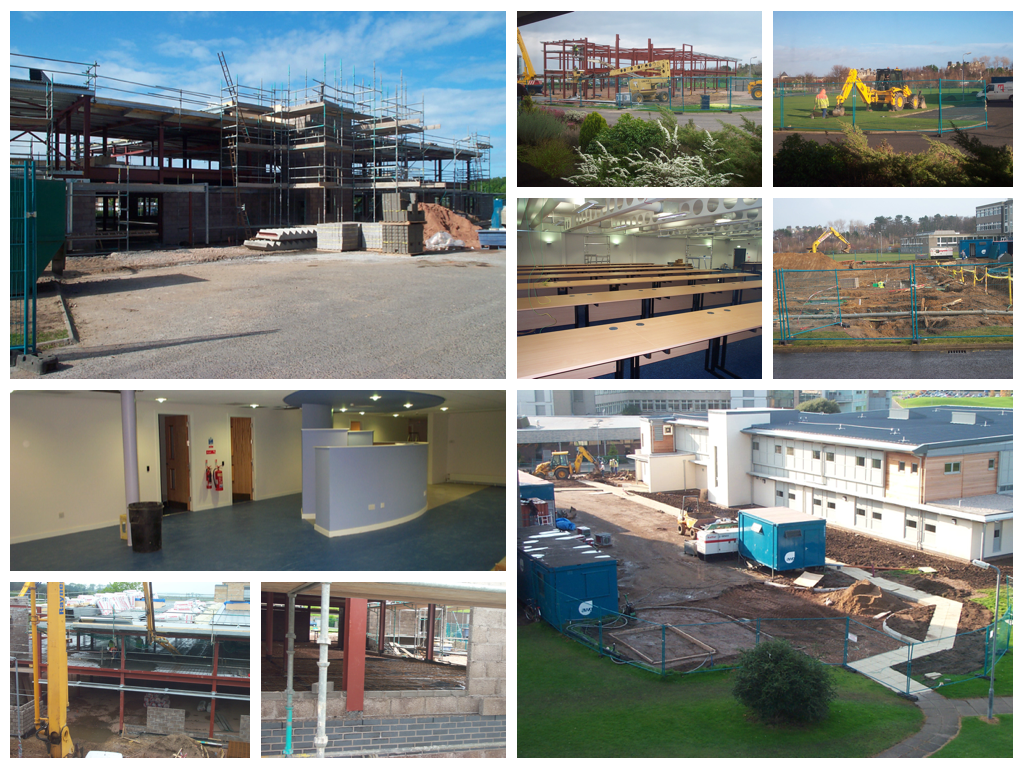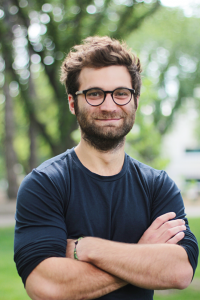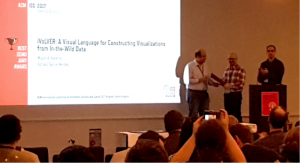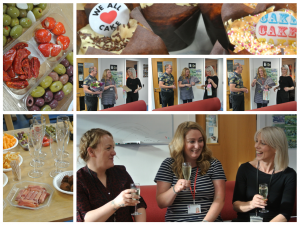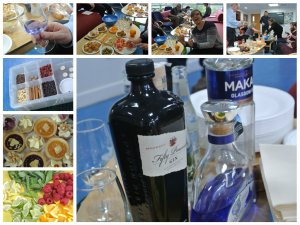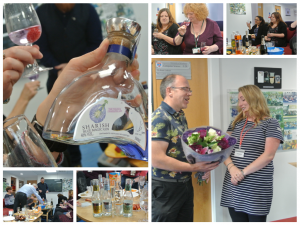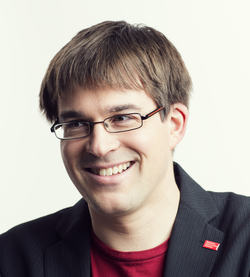Congratulations to Adam Barwell, who successfully defended his thesis yesterday. Adam’s thesis was supervised by Professor Kevin Hammond. He is pictured with second supervisor Dr Christopher Brown, Internal examiner Dr Susmit Sarkar and external examiner Professor Susan Eisenbach from Imperial College, London.
“Ambient intelligence with sensor networks” by Lucas Amos and “Location, Location, Location: Exploring Amazon EC2 Spot Instance Pricing Across Geographical Regions” by Nnamdi Ekwe-Ekwe
Lucas’s abstract
“Indoor environment quality has a significant effect on worker productivity through a complex interplay of factors such as temperature, humidity and levels of Volatile Organic Compounds (VOCs).
In this talk I will discuss my Masters project which used off the shelf sensors and Raspberry Pis to collect environmental readings at one minute intervals throughout the Computer Science buildings. The prevalence of erroneous readings due to sensor failure and the strategy used for the identification and correction of such faults will be presented. Identifiable correlations between environmental variables and attempts to model these relationships will be discussed
Past studies identifying the ideal environmental conditions for human comfort and productivity allow for the objective assessment of indoor environmental conditions. An adaptation of Frešer’s environment rating system will be presented, showing how VOC levels can be incorporated into assessments of environment quality and how this can be communicated to building users.”
Nnamdi’s abstract
“Cloud computing is becoming an almost ubiquitous part of the computing landscape. For many companies today, moving their entire infrastructure and workloads to the cloud reduces complexity, time to deployment, and saves money. Spot Instances, a subset of Amazon’s cloud computing infrastructure (EC2), expands on this. They allow a user to bid on spare compute capacity in Amazon’s data centres at heavily discounted prices. If demand was ever to increase such that the user’s maximum bid is exceeded, their compute instance is terminated.
In this work, we conduct one of the first detailed analyses of how location affects the overall cost of deployment of a spot instance. We simultaneously examine the reliability of pricing data of a spot instance, and whether a user can be confident that their instance has a low risk of termination.
We analyse spot pricing data across all available Amazon Web Services regions for 60 days on a variety of instance types. We find that location does play a critical role in spot instance pricing and also that pricing differs depending on the granularity of the location – from a more coarse-grained AWS region to a more fine-grained Availability Zone within a region. We relate the pricing differences we find to the price’s stability, confirming whether we can be confident in the bid prices we make.
We conclude by showing that it is very possible to run workloads on Spot Instances achieving
both a very low risk of termination as well as paying very low amounts per hour.”
Event details
- When: 9th November 2017 13:00 - 14:00
- Where: Cole 1.33a
- Series: Systems Seminars Series
- Format: Seminar
Towards Refinement by Resolution in Dependent Type Theory – František Farka
Abstract
Dependent types are increasingly used in functional programming languages. The surface syntax of dependent types, as seen by a programmer, is elaborated by a compiler into an internal, type-theoretic representation. In order to perform this step, the compiler needs to infer a nontrivial amount of information to successfully type-check the internal representation. This process—type refinement—is complex, implementation dependent, and very few formal developments currently exist. We discuss a novel and simpler formalisation of type refinement in first order type theory with dependent types. We propose a translation of type-refinement problems to Horn-Clause logic with explicit proof-terms, using proof-relevant resolution as the type inference mechanism.
Event details
- When: 9th November 2017 12:00 - 13:00
- Where: Cole 1.33b
- Format: Talk
One from the archives: Plans for new Computer Science building
November 2002, and plans were unveiled in the university news, for a new computer science building. Stages of the build were photographed for posterity.
Fast forward to March 2005, and the Jack Cole building was officially opened by the then First Minister, Jack McConnell. The building was named after the founder of Computer Science at St Andrews, Professor Alfred Jack Cole.
SACHI Seminar: Alix Goguey (University of Saskatchewan) – Augmenting touch expressivity to improve the touch modality
Title
Augmenting touch expressivity to improve the touch modality
Abstract
During the last decades, touch surfaces have become more and more ubiquitous. Whether on tablets, on smartphones or on laptops, touch surfaces are used by a majority of us on a daily basis. However, the limited expressivity – the different channels used to convey information to the system – of the touch modality restricts drastically the amount of features that can be controlled via touch only. For instance, a typical smartphone touchscreen only provides the absolute position of a contact on the screen, thus applications usually offer only one way to carry out tasks (which can augment user frustration or cap performances) or restrict possibilities (e.g. Photoshop on desktop offers more than 600 commands but only about 40 on smartphones and tablets). In this talk, I will present an overview of my on-going research and discuss different ways to tackle this problem, augment touch expressivity and user efficiency: from tools that helps better designing touch interfaces to the use of new input dimensions in original interaction techniques.
Speaker biography
Alix Goguey is a post postdoctoral fellow working with Carl Gutwin in the Interaction Lab at the University of Saskatchewan, Canada. He received his Ph.D. in Computer Science in October 2016 in the Mjolnir research group at Inria Lille – Nord Europe, France, under the supervision of Géry Casiez. His work focuses on understanding and designing interaction techniques on touch input devices and particularly through the use of new information such as finger identification. To learn more about Alix’s work: www.alixgoguey.fr
Event details
- When: 1st November 2017 13:15 - 14:15
- Where: Honey 103 - GFB
- Format: Seminar
Thesis Summary Presentation – Adam Barwell
Adam Barwell (adb23) will be presenting a summary of his recently submitted thesis.
Event details
- When: 2nd November 2017 12:00 - 13:00
- Where: Cole 1.33b
- Format: Talk
Computer Science Student Representatives 2017
Congratulations to our student representatives for 2017/8, elected by their peers last month. Our Reps are integral to the proactive communication channel between staff and the students and also chair and run the Staff-Student Consultative Committee (SSCC) held each semester within the School.
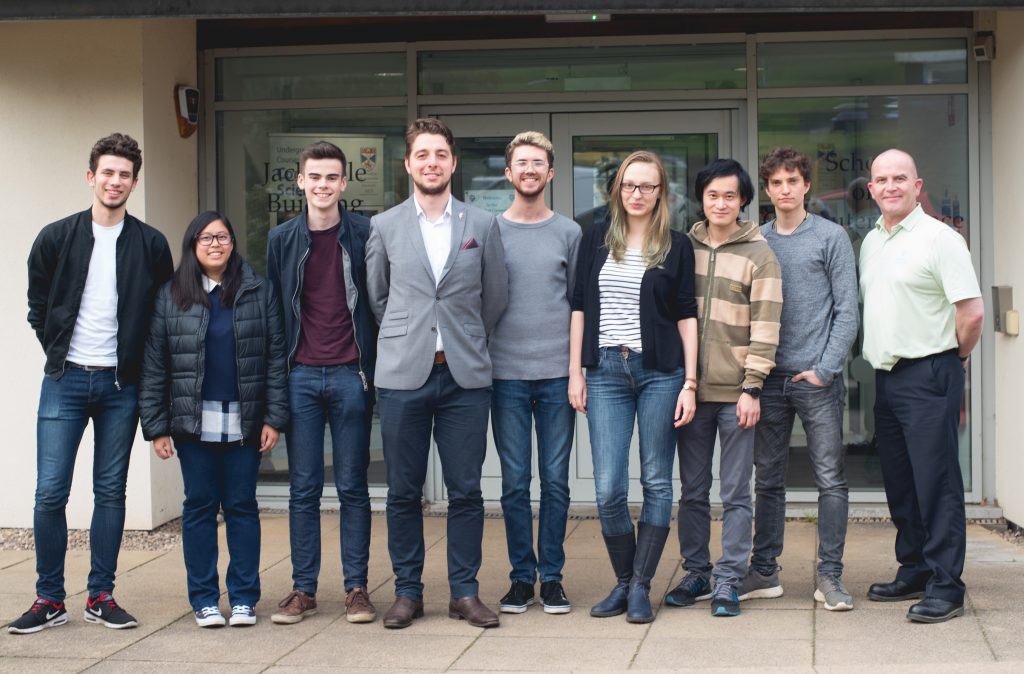
The reps are pictured outside the Jack Cole Building, after this semester’s SSCC meeting and are (from left to right)
- Lewis Mazzei (1st year, minutes)
- Beatrice Olivera (1st year, minutes)
- Jamie Bell (2nd year, careers)
- Gergely Flamich (School President)
- Arnold Haidu (MSc, library)
- Stacey Izmaylova (3rd year, social)
- Xu Zhu (PhD, Postgrad)
- Keno Schwalb (4th year)
- Paul McKay (Evening)
Image courtesy of Ula Rustamova
iVoLVER receives Best Demo Jury Award at ACM ISS
The iVoLVER system, created by Gonzalo Méndez and Miguel Nacenta from the SACHI group at the School of Computer Science, University of St Andrews, received Best Demo Jury Award at the ACM Interactive Surfaces and Spaces (ACM ISS) conference last week.
ACM ISS 2017, took place in Brighton, UK and selects a different location each year, with Tokyo, Japan selected as next year’s destination. The conference is a premier venue for research that studies how people interact in smart spaces and surfaces and how to design and engineer solutions for novel interfaces.
iVoLVER is a web-based visual programming environment that enables anyone to transform visualizations that they find in-the-wild (e.g., in a poster or a newspaper) into new visualizations that are more useful for them. Congratulations to the iVoLVER team. You can try out the open source iVoLVER prototype using a browser.
Ae fond farewell: Vicky Robinson
Vicky Robinson, a valued member of our admin team, has departed for pastures new. Vicky and colleagues are pictured earlier this month, enjoying some nibbles and fizz, to mark her last day. Staff also organised an informative and enjoyable Gin tasting courtesy of Luvians. Fare thee well Vicky, thanks for all the hard work, and have a fabulous new adventure in Cyprus.
SACHI Seminar – Florian Echtler (Bauhaus-Universität Weimar): Instant Interaction
Title:
Instant Interaction
Abstract:
Although Mark Weiser’s original vision of “ubiquitous computing” has all but arrived due to the wide availability of smartphones, tablets and interactive screens, the envisioned ease of use is still mostly lacking. This is particularly apparent when we consider interaction and collaboration between multiple persons and their personal mobile devices. These issues can be partly mitigated by relying on cloud services for data exchange, but this approach opens up multiple other issues regarding data safety and privacy. In this talk, I will present the concept of “instant interaction”, which aims to enable ad-hoc interaction between multiple persons, their individual mobile devices, and fixed infrastructure, without requiring any prior exchange of account data or PINs. The only prerequisite for immediate interaction is physical proximity. Examples from my current research will illustrate this concept.
Speaker Biography:
Florian Echtler is junior professor for mobile media at Bauhaus-Universität Weimar. His research interests focus on interaction and collaboration using peer-to-peer communication technologies available in today’s mobile devices. Additional topics covered by his research include computer vision for HCI applications, sensor technology and gesture recognition.
Event details
- When: 16th November 2017 15:00 - 16:00
- Where: Cole 1.33b
- Format: Seminar


